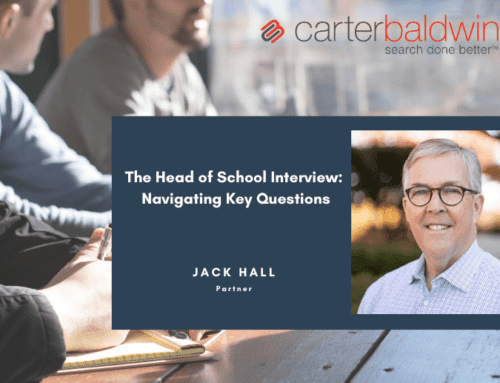There is a shortage of leaders-even in our current economic environment-who bring both specific technical expertise and strategic general business acumen to the table. Smart organizations are looking for and hiring it. Smart leadership candidates are acquiring and marketing it.
This shortage is magnified in technical professions like tax, accounting and technology where very specialized legal, technical, analytical or engineering aptitude is the price of entry into the field, but progression and true leadership requires general business acumen, management ability and business development skill. Despite the downturn, these well-rounded individuals are in high demand because they generate higher-return results at a faster pace.
Conversely, it is common to see company leaders who were promoted or hired based on the technical ability that led to their success in prior roles as opposed to their aptitude or demonstrated ability for success at the next level. This practice has a negative effect on the trajectory of a company’s performance as well as a person’s career. From a recent Harvard Business Review1: “Many general managers rise up from specialist positions. Traders are promoted to run banks, engineers to manage technology firms, lawyers to oversee law firms. They excel in their sport, and as a reward, they’re recruited to play a different game altogether, for which they are often ill-suited.”
Consider the tax & accounting business. Many public accounting, tax and consulting firms have shed employees through the economic downturn. But almost all continue to seek partners and practice leaders who can start, build, grow and lead practices and business lines. CPAs that can sell. Tax lawyers that can write and execute a compelling differentiated business plan. Auditors that can build and motivate a high performance team to produce exceptional results. There are throngs of tax & accounting “technicians.” Far fewer who are effectual, holistic business people; that hire is a rare breed and will earn a high salary.
I’ve observed a continuum where every individual fits within an organization:
Level 1, The Technician: While the nature of their work is sophisticated and complex, this individual is largely an executer. Results = quality work product (analysis, research, etc.).
Level 2, The Partner: The best partners have Level 1 perfected and are proficient sales people. They lead strong teams that generate great work. Moving to Level 2 requires external aptitude and basic management ability. Results = sales growth and quality work product delivered by Level 1s.
Level 3, The Practice Leader: This individual has responsibility for multiple partners, usually with a geographic or functional specialization. In addition to Level 1 and 2 skills, the Level 3 player must build and lead a team of high performing Level 2s and drive results at the practice level. Results = Multiplicative revenue growth beyond the Level 2 individual.
Level 4, The C-Suite: At this level, the technical skills of Level 1 are replaced to some degree with a more complete understanding of the art and science of business. An experienced CEO, for example, may have lost some of the technical edge that allowed him to climb the corporate ladder, but he’s exchanged it with the general management skills, strategic insight and executive presence necessary to develop and lead the organization’s vision, mission and positioning. This individual allocates resources, builds executive teams and manages the trajectory of the entire enterprise. Results = firm growth, organizational engagement and economic value generated for the shareholders.
I call this the Continuum of Results and it exists in one form or another at every level in nearly every organization. Members of an organization’s executive leadership group, no matter the specific functional area, must possess a broader and more general business ability and understanding of the marketplace nuances. While moving through the ranks based on technical ability, the general principle applies-a Level 4 leader’s accountability is to the growth and performance of the company.
If you aspire to advance to the next level, you must be intentional about expanding the impact you have on the organization. Advancement requires honing both the specialized skills of your profession and your broader business, managerial, business development and leadership skills. Focus on identifying and learning the results generated in the role you seek versus the (more obvious) operational and functional activities involved.
Re-read your resume. If it is like most, it describes work done as opposed to results accomplished. The effort is important, but the result is the end game. Become adept at identifying the valued outcome and perform at that next level, and you’ll see your impact and earnings grow.
If you are on the hiring side trying to attract the executive leadership necessary to drive your business to the next level, focus on the results you’re after as well. What do you want to accomplish in the next year, and two and three? Defining that sounds obvious, but it is surprising how many hiring managers list the activities that make up the role as opposed to the valuable impact they’re really after.
In today’s business environment, performance is measured in results, not activities. It may seem to be about semantics, but it can be the difference between a costly mis-hire of someone with an impressive technical pedigree and a leader who can add to the bottom line.





